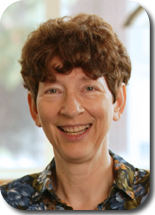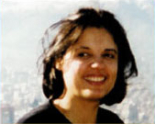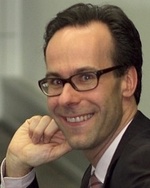Invited Talks
-
Margaret Burnett, Oregon State
University, USA
Title: What is End-User Software Engineering and Why Does It Matter? -
Gerhard Fischer, University of
Colorado, Boulder, USA
Title: End-User Development and Meta-Design: Foundations for Cultures of Participation -
Yasmin Kafai, University of
Pennsylvania, USA
Title: Mediators for Creative Designs: Pathways and Participation in Communities of Young Programmers -
Pelle Ehn, Malmö University,
Sweden
Title: Making Design Take Place - Frank T. Piller, RWTH Aachen University, Germany
- [canceled] Jörg Beringer, SAP, Palo Alto, USA
Margaret Burnett, Oregon State University, USA
 Margaret
Burnett is a Professor of Computer Science at the School of
Electrical Engineering and Computer Science at Oregon State
University. Her current research focuses on end-user
programming, end-user software engineering, and gender issues
in those contexts. She has a long history of research in these
issues and others relating to human issues of programming. She
is also the principal architect of the Forms/3 and the FAR
visual programming languages and, together with Gregg
Rothermel, of the WYSIWYT testing methodology for end-user
programmers. She is the founding Project Director of the EUSES
Consortium, a multi-institution collaboration among Oregon
State University and Carnegie Mellon, Drexel University,
Pennsylvania State, University of Nebraska, University of
Washington, University of Cambridge (U.K.), and IBM to help End
Users Shape Effective Software.
Margaret
Burnett is a Professor of Computer Science at the School of
Electrical Engineering and Computer Science at Oregon State
University. Her current research focuses on end-user
programming, end-user software engineering, and gender issues
in those contexts. She has a long history of research in these
issues and others relating to human issues of programming. She
is also the principal architect of the Forms/3 and the FAR
visual programming languages and, together with Gregg
Rothermel, of the WYSIWYT testing methodology for end-user
programmers. She is the founding Project Director of the EUSES
Consortium, a multi-institution collaboration among Oregon
State University and Carnegie Mellon, Drexel University,
Pennsylvania State, University of Nebraska, University of
Washington, University of Cambridge (U.K.), and IBM to help End
Users Shape Effective Software.
Invited Talk: What is End-User Software Engineering and Why Does It Matter?
Abstract. End-user programming has become ubiquitous, so much so that there are more end-user programmers today than there are professional programmers. End-user programming empowers—but to do what? Make really bad decisions based on really bad programs? Enter software engineering’s focus on quality. Considering software quality is necessary, because there is ample evidence that the programs end users create are filled with expensive errors. In this talk, I consider what happens when we add to end-user programming environments considerations of software quality, going beyond the “create a program” aspect of end-user programming. I describe a philosophy to software engineering for end users, and then survey several projects in this area. A basic premise is that end-user software engineering can only succeed to the extent that it respects the fact that the user probably has little expertise or even interest in software engineering.
Gerhard Fischer, University of Colorado, Boulder, USA
 Gerhard Fischer is the
director of the Center for Lifelong Learning and Design (L3D),
a professor in the Department of Computer Science, and a fellow
of the Institute of Cognitive Science, all at the University of
Colorado, Boulder. His research interests include: lifelong
learning, design, meta-design, software design, creativity,
social creativity, distributed intelligence, human-computer
interaction, and design-for-all (assistive technologies). Over
the last twenty years, he has directed research projects and
has published extensively in these areas.
Gerhard Fischer is the
director of the Center for Lifelong Learning and Design (L3D),
a professor in the Department of Computer Science, and a fellow
of the Institute of Cognitive Science, all at the University of
Colorado, Boulder. His research interests include: lifelong
learning, design, meta-design, software design, creativity,
social creativity, distributed intelligence, human-computer
interaction, and design-for-all (assistive technologies). Over
the last twenty years, he has directed research projects and
has published extensively in these areas.
Invited Talk: End-User Development and Meta-Design: Foundations for Cultures of Participation
Abstract. The first decade of the World Wide Web predominantly enforced a clear separation between designers and consumers. New technological developments, such as the cyberinfrastructure and Web 2.0 architectures, have emerged to support a participatory Web. These developments are the foundations for a fundamental shift from a consumer culture (specialized in producing finished goods to be consumed passively) to a culture of participation (in which all people are provided with the means to participate actively in personally meaningful activities). End-user development and meta-design provide foundations for this fundamental transformation. They explore and support new approaches for the design, adoption, appropriation, adaptation, evolution, and sharing of artifacts by all participating stakeholders. They take into account that cultures of participation are not dictated by technology alone: they are the result of incremental shifts in human behavior and social organizations.
Yasmin Kafai, University of Pennsylvania, USA
 A Professor of
Learning Sciences at the University of Pennsylvania’s Graduate
School at Education, Yasmin Kafai investigates learning
opportunities in virtual worlds, designs media-rich programming
tools and communities together with colleagues from MIT, USC
and industry. In the early 90’s at the Media Lab she was one of
the first researchers to engage hundreds of children as game
designers in schools to learn about programming, mathematics
and science. While at UCLA, she designed virtual epidemics in
Whyville.net, an online world with millions of players age
8-16, to help teens learn about infectious disease. She also
studied how urban youth create media art, games, and graphics
in Scratch, a visual programming language developed together
with MIT colleagues. Her research has been published in several
books, among them “Minds in Play” (1995), “Constructionism in
Practice” (1996 with Mitchel Resnick), “Beyond Barbie and
Mortal Kombat: New Perspectives of Gender and Gaming” (2008
with Carrie Heeter, Jill Denner and Jennifer Sun) and the
upcoming “The Computer Clubhouse: Constructionism and
Creativity in Youth Communities” (with Kylie Peppler and Robbin
Chapman). She has studied in France, Germany and the United
States and holds a doctorate from Harvard University.
A Professor of
Learning Sciences at the University of Pennsylvania’s Graduate
School at Education, Yasmin Kafai investigates learning
opportunities in virtual worlds, designs media-rich programming
tools and communities together with colleagues from MIT, USC
and industry. In the early 90’s at the Media Lab she was one of
the first researchers to engage hundreds of children as game
designers in schools to learn about programming, mathematics
and science. While at UCLA, she designed virtual epidemics in
Whyville.net, an online world with millions of players age
8-16, to help teens learn about infectious disease. She also
studied how urban youth create media art, games, and graphics
in Scratch, a visual programming language developed together
with MIT colleagues. Her research has been published in several
books, among them “Minds in Play” (1995), “Constructionism in
Practice” (1996 with Mitchel Resnick), “Beyond Barbie and
Mortal Kombat: New Perspectives of Gender and Gaming” (2008
with Carrie Heeter, Jill Denner and Jennifer Sun) and the
upcoming “The Computer Clubhouse: Constructionism and
Creativity in Youth Communities” (with Kylie Peppler and Robbin
Chapman). She has studied in France, Germany and the United
States and holds a doctorate from Harvard University.
Invited Talk: Mediators for Creative Designs: Pathways and Participation in Communities of Young Programmers
Abstract. Today, millions of youth not only participate but also contribute to network, blog, video and gaming sites by sharing graphics, writings, music and often their own work. While these forms of creative participation are now fixtures of youth culture, little progress has been made to engage youth in contributions that require them to be more technology fluent. My talk will focus on opportunities and challenges in creating and studying communities of young programmers. As an example, I will use Scratch, a media-rich programming environment developed together with Mitchel Resnick and colleagues at the MIT Media Lab to enhance technology fluency in Computer Clubhouses and afterschool programs in low-income communities. A shared Scratch community web site allows members to examine, discuss and comment on one another’s projects, and download programming code. During the last five years, we have studied the role different mediators play in forming and joining local and global communities of software designers.
Pelle Ehn, Malmö University, Sweden
 Professor Pelle
Ehn has for more than three decades internationally played a
major role in the research field of participatory design and in
bridging design and information technology. Research projects
include Demos from the seventies on information technology and
work place democracy, UTOPIA from the eighties on user
participation and skill based design, and ATELIER from this
decade, on architecture and technology for creative
environments. In 1998, he co-founded The School of Arts and
Communication and the Interactive Institute as a kind of
'Digital Bauhaus' in Malmö, Sweden. His many volumes include
Computers and Democracy (1987), Work-Oriented Design of
Computer Artifacts (1988), Manifesto for a Digital Bauhaus
(1998), Participatory Design and the Collective Designer
(2002), Participation in Interaction Design (2006) and Out of
the Box (2007).
Professor Pelle
Ehn has for more than three decades internationally played a
major role in the research field of participatory design and in
bridging design and information technology. Research projects
include Demos from the seventies on information technology and
work place democracy, UTOPIA from the eighties on user
participation and skill based design, and ATELIER from this
decade, on architecture and technology for creative
environments. In 1998, he co-founded The School of Arts and
Communication and the Interactive Institute as a kind of
'Digital Bauhaus' in Malmö, Sweden. His many volumes include
Computers and Democracy (1987), Work-Oriented Design of
Computer Artifacts (1988), Manifesto for a Digital Bauhaus
(1998), Participatory Design and the Collective Designer
(2002), Participation in Interaction Design (2006) and Out of
the Box (2007).
Invited Talk: Making Design Take Place
Frank T. Piller, RWTH Aachen University, Germany
 Frank T. Piller is a
professor of management and chair of the Technology &
Innovation Management Group of RWTH Aachen University. He was
appointed to the chair after Prof. Dr. Hans-Horst Schröder
retired in March 2007. He is also a founding faculty member of
the MIT Smart Customization Group at the Massachusetts
Institute of Technology, USA. Before entering his recent
position, he worked at the MIT Sloan School of Management (BPS,
Innovation and Entrepreneurship Group, 2004-2007) and has been
an associate professor of management at TUM Business School,
Technische Universitaet Muenchen (1999-2004), where he led the
research team "Customer Centric Value Creation".
Frank T. Piller is a
professor of management and chair of the Technology &
Innovation Management Group of RWTH Aachen University. He was
appointed to the chair after Prof. Dr. Hans-Horst Schröder
retired in March 2007. He is also a founding faculty member of
the MIT Smart Customization Group at the Massachusetts
Institute of Technology, USA. Before entering his recent
position, he worked at the MIT Sloan School of Management (BPS,
Innovation and Entrepreneurship Group, 2004-2007) and has been
an associate professor of management at TUM Business School,
Technische Universitaet Muenchen (1999-2004), where he led the
research team "Customer Centric Value Creation".
[canceled] Jörg Beringer, SAP, Palo Alto, USA
 Jörg Beringer leads the
user experience group of Emerging Solutions, an innovative
development organization at SAP Labs, Palo Alto. The group is
focused on new emergent trends in business applications. He
joined SAP in 1997 and became responsible for managing
strategic design projects within the EnjoySAP initiative. After
establishing user centered design as part of SAP’s best
practices in requirements engineering, he moved to the
Enterprise Portal group where he specialized in user
productivity and work group support in business applications.
Jörg Beringer currently manages the user experience design
group supporting xApps—SAP’s first generation of composite
applications. In his architectural role, he is committed to
promoting new ideas and innovative solutions for frameworks
that improve the user experiences in business applications. He
holds a PhD in Cognitive Psychology, from Technical University
in Darmstadt.
Jörg Beringer leads the
user experience group of Emerging Solutions, an innovative
development organization at SAP Labs, Palo Alto. The group is
focused on new emergent trends in business applications. He
joined SAP in 1997 and became responsible for managing
strategic design projects within the EnjoySAP initiative. After
establishing user centered design as part of SAP’s best
practices in requirements engineering, he moved to the
Enterprise Portal group where he specialized in user
productivity and work group support in business applications.
Jörg Beringer currently manages the user experience design
group supporting xApps—SAP’s first generation of composite
applications. In his architectural role, he is committed to
promoting new ideas and innovative solutions for frameworks
that improve the user experiences in business applications. He
holds a PhD in Cognitive Psychology, from Technical University
in Darmstadt.

 News feed [RSS]
News feed [RSS]
